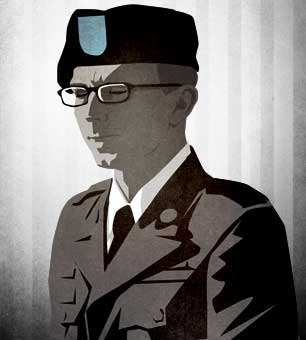Pfc. Bradley Manning has been found not guilty of “aiding the enemy” by leaking hundreds of thousands of classified national security documents, which implicate the United States in war crimes, to WikiLeaks in a verdict announced Tuesday by Judge Col. Denise Lind at a military base in Fort Meade, Maryland.
He has been found guilty of 19 other counts including five counts of violating the Espionage Act. Manning could be sentenced to more than 100 years in prison on each of his 19 counts. Sentencing will be announced Wednesday at 9:30 am Eastern Time.
Manning was charged with 21 criminal counts including the “aiding the enemy” charge. His charges include espionage, computer fraud and embezzlement of government property. It’s likely Manning’s defense team will appeal. The 19 counts Manning was charged with range in sentencing from two to 10 years in prison.
Shayana Kadidal, managing attorney for Guantánamo litigation at the Center for Constitutional Rights, told Truthout that the verdict on Manning’s “aiding the enemy” charges could obscure the fact that Americans should be equally concerned about Manning’s verdict on counts relating to the Espionage Act.
“Is there anybody in this country who is more responsible for getting our own soldiers home and out of harm’s way than Bradley Manning? I don’t think you can find anybody, including the president, who deserves more credit for that,” he said.
Judge Col. Denise Lind began deliberating when closing arguments wrapped up at Fort Meade Friday after nearly two months of proceedings in Manning’s court-martial. Before his trial, Manning spent more than three years in prison, 10–and-a-half months of which in solitary confinement.
During the proceedings government prosecutors painted Manning as a traitor, anarchist and narcissist who had a “general evil intent” in disclosing classified information that he knew would get to enemies of the United States. But this portrait of Manning appeared to be in stark contrast with his actions. Manning has admitted to sending hundreds of thousands of documents to WikiLeaks, but his defense says he carefully culled through the documents, revealing only the those which implicated the U.S. military in war crimes and malfeasance.
Manning has dodged the most serious charge in “aiding the enemy” in leaking classified information. Previously, all those found guilty of “aiding the enemy” charges have given classified information directly to an enemy of the United States, most commonly in the form of prisoners of war who gave information to war-time enemies.
In a legal filing last week, Manning’s defense attorney David Coomb’s requested a mistrial on all charges relating to the embezzlement of government property in violation of a federal statute after Judge Col. Lind allowed the prosecution to alter the charges relating to that statute after legal arguments had already been made. The government sought to change the legal language, asserting Manning stole “databases” instead of specific records from those databases.
The change is legally significant to the case, and since Coombs had already made his arguments, he cannot retroactively change his questioning or arguments in the five counts of theft Manning has now been convicted of. Coomb’s renewed the motion for a mistrial July 25.
Manning’s court-martial has been shrouded in secrecy throughout the proceedings. Court documents have been withheld and redacted and any media presence has been heavily monitored, including having armed military police peering over their shoulders to view their laptops while inside the media center at Fort Meade.
But whether or not his court-martial will be seen as a kangaroo court in its aftermath, Manning’s acquittal of “aiding the enemy” bypasses a dangerous precedent that could have chilled potential future whistleblowers and the journalists who cite them.
During the trial last week the Judge Col. Lind asked the prosecution whether or not it would have made a difference if Manning had leaked his materials directly to major newspapers like The New York Times or The Washington Post, to which Prosecutor Capt. Angel Overgaard told the judge it “would not have made a difference.”
“[Manning] discovered things that were so wrong that his oath of patriotism, his ethical devotion to the military code of conduct, had to be pushed aside by his fundamental morality,” said American University journalism ethics professor John Watson.
Manning’s verdict may have just saved the future of leak-based journalism in the United States.
We have 10 days to raise $50,000 — we’re counting on your support!
For those who care about justice, liberation and even the very survival of our species, we must remember our power to take action.
We won’t pretend it’s the only thing you can or should do, but one small step is to pitch in to support Truthout — as one of the last remaining truly independent, nonprofit, reader-funded news platforms, your gift will help keep the facts flowing freely.
